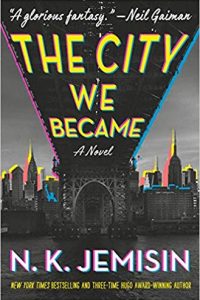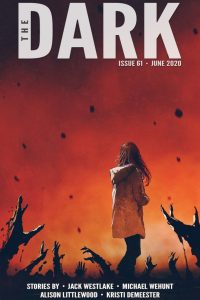Gary K. Wolfe Reviews The Bruising of Qilwa by Naseem Jamnia
 The Bruising of Qilwa, Naseem Jamnia (Tachyon 978-1-61696-378-1, $15.95, 176pp, tp) August 2022. Cover by Elizabeth Story
The Bruising of Qilwa, Naseem Jamnia (Tachyon 978-1-61696-378-1, $15.95, 176pp, tp) August 2022. Cover by Elizabeth Story
The Bruising of Qilwa is the first novel by non-binary Persian-American author Naseem Jamnia, who last year received the first Samuel R. Delany Fellowship, sponsored by CatStone Books, to recognize SFF writers from ‘‘a community that has been traditionally marginalized in speculative fiction,’’ according to their website. It seems like an excellent choice, not only because of the small but engaging cast of characters and the complex social and political situation Jamnia thrusts them into, but because marginalization itself informs the novella at almost every level. Firuz-e Jafari, a non-binary healer in an ancient tradition called blood magic, is also a refugee in the city of Qilwa, where they have found employment at a free clinic run by the idealistic Kofi, whose clientele consists largely of immigrants and refugees like Firuz. (Jamnia is careful to maintain the characters’ preferred pronouns, which they use as prefixes to their names when first introduced.) While the plight of refugees and a fraught history of colonialism, imperialism, and even ethnic cleansing looms heavily over the narrative, Jamnia’s central plot is essentially a medical mystery, complicated by the city’s problematic public health policies.
Although a plague in Qilwa has begun to abate, Firuz notices that a number of patients at the clinic are exhibiting strange new symptoms, characterized by bruising, exhaustion, and slow blood clotting. Stranger still, none of the other clinics in the city seem to report any such patients. While Firuz is trying to puzzle out the mystery, they meet a teenage orphan named Afsoneh, who has extraordinary magical powers of her own, but is barely able to control them. Complicating matters further, Firuz and Kofi are summoned before the governor – who determines which clinics will be publicly funded – and face accusations of practicing blood magic, which is associated with the despised refugees from neighboring Dilmun. Many of the refugees, like Firuz, are Sassanians, a once-powerful group who are now outcasts, targeted by an ongoing siege which begins to look uncomfortably like the ethnic cleansing I mentioned earlier. Firuz claims to be practicing only ‘‘structural magic,’’ however, while Kofi’s practice is based on the medieval theory of humors. With three distinct forms of healing at work, the novel takes on some aspects of a purely medical thriller, and this becomes more evident later in the tale, when Jamnia introduces some actual hematology into the mix, include the possible discovery of immunization and antibodies.
With its complex geopolitical backstory involving Sassanians shifting from colonizers to the colonized and eventually to refugees, its intriguing portrayal of the city-state of Qilwa, its medical puzzles, and its examination of the varieties of prejudice and distrust – especially after a local boy dies from the bruising disease while being treated by Firuz – The Bruising of Qilwa has a lot on its rather small plate. It’s hardly a complaint to suspect that many readers might hope for a more thorough introduction to this world; some details are barely mentioned in passing. But Jamnia keeps things under control by focusing on a handful of well-drawn characters – not only the thoughtful and humane Firuz, but the apparently kindly Kofi (who turns out to have a few dark secrets of his own), the powerful but immature Afsoneh, and Firuz’s younger brother, who provides a kind of reality check on the other characters’ preoccupations with magic. Like many of the best novellas we’ve been seeing these last few years, The Bruising of Qilwa is something of a Tardis tale, considerably bigger on the inside than it first appears, and it’s a rewarding addition to that growing body of fantastic fiction addressing themes of colonialism, bigotry, gender, and cultural identity. The world of the book is one we’d like to know more about, and Jamnia is a writer worth paying attention to.
Gary K. Wolfe is Emeritus Professor of Humanities at Roosevelt University and a reviewer for Locus magazine since 1991. His reviews have been collected in Soundings (BSFA Award 2006; Hugo nominee), Bearings (Hugo nominee 2011), and Sightings (2011), and his Evaporating Genres: Essays on Fantastic Literature (Wesleyan) received the Locus Award in 2012. Earlier books include The Known and the Unknown: The Iconography of Science Fiction (Eaton Award, 1981), Harlan Ellison: The Edge of Forever (with Ellen Weil, 2002), and David Lindsay (1982). For the Library of America, he edited American Science Fiction: Nine Classic Novels of the 1950s in 2012, with a similar set for the 1960s forthcoming. He has received the Pilgrim Award from the Science Fiction Research Association, the Distinguished Scholarship Award from the International Association for the Fantastic in the Arts, and a Special World Fantasy Award for criticism. His 24-lecture series How Great Science Fiction Works appeared from The Great Courses in 2016. He has received six Hugo nominations, two for his reviews collections and four for The Coode Street Podcast, which he has co-hosted with Jonathan Strahan for more than 300 episodes. He lives in Chicago.
This review and more like it in the July 2022 issue of Locus.
 While you are here, please take a moment to support Locus with a one-time or recurring donation. We rely on reader donations to keep the magazine and site going, and would like to keep the site paywall free, but WE NEED YOUR FINANCIAL SUPPORT to continue quality coverage of the science fiction and fantasy field.
While you are here, please take a moment to support Locus with a one-time or recurring donation. We rely on reader donations to keep the magazine and site going, and would like to keep the site paywall free, but WE NEED YOUR FINANCIAL SUPPORT to continue quality coverage of the science fiction and fantasy field.
©Locus Magazine. Copyrighted material may not be republished without permission of LSFF.






